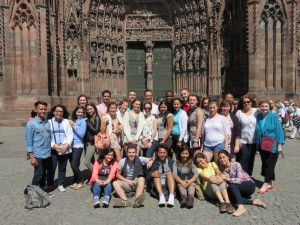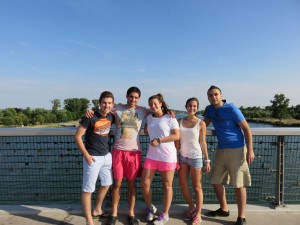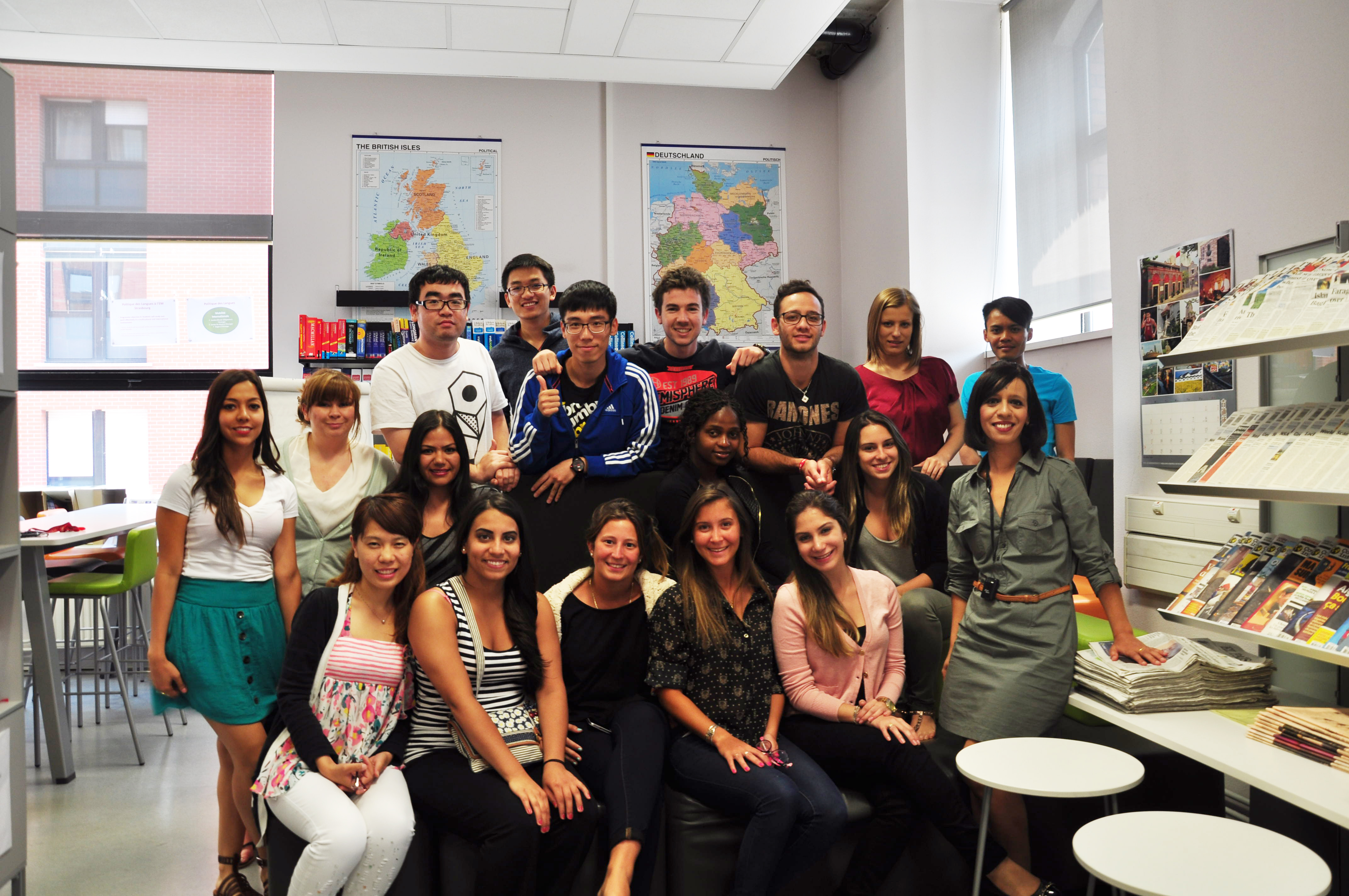Here is Dewald’s story.
The experience of a lifetime
From the moment I heard about the opportunity of going to France to study European business, I knew that this would be an opportunity like no other which had to be embraced.
A friend told me about this opportunity over a cup of coffee at the Neelsie Student centre. This happened 1 week before the application deadline for the EM Strasbourg Business Summer School. As from many past experiences I knew that by putting in some effort with my application process anything is possible.
Instead of the usual application form, the Postgraduate & International Office decided this year to use videos as part of their selection process. As applicants we had to create an 8 minute video reflecting our personal goals in life as well as a motivation why we had to be selected for this opportunity.
Due to the short notice I had and all the tests that I was busy writing at that stage, I only managed to prepare my application the day before the closing date. With the help of some brilliant friends I managed to finish my video and application just in time.
After hearing the great news of being selected to represent Stellenbosch University at this event I had to start preparing for this four and a half week trip to a foreign country. The preparation beforehand was a learning curve in itself. From the start I decided to leave the important planning to those who have experience in this terrain. I went to a travel agency to find the cheapest flights and best way to get to Strasbourg as efficient as possible.
In the meantime I had to make an appointment at the French embassy to apply for my visa. Being well organised and keeping track of everything helps to ease this process. The Stellenbosch International Office gave their support throughout the process. The most difficult part for me during this process was to do everything thoroughly while still managing to focus on my studies as I was writing at least one test per week at that stage.
At the end I was well prepared and my traveling to Strasbourg went smoothly (with a few delays here and there).
Arriving in Strasbourg I was greeted by the friendly lady Daniela who is in charge of the International Program at Strasbourg University. She is a very dynamic person and a brilliant person to work with if you have any problems in Strasbourg. As I arrived at my residence I was overwhelmed by something I didn’t expect. Our group consisted of 32 students from 16 different countries.
I was faced by a situation that reflects a similar environment that we have in South Africa, only to the next level, namely diversity. I knew that I would immediately have to adapt to new cultures, languages and perspectives. Not only did I have to adapt to these differences but I also had to respect these new perspectives and accept them. Once you start to accept different cultures you open yourself to a whole new world of opportunities and perspectives that enrich your life. The different nationalities were:
- South African
- Lebanese
- Chinese
- Indonesian
- British
- Polish
- Argentinian
- American
- Columbian
- Mexican
- Zimbabwean
- Austrian
- Finish
- Costa Rican
- Venezuelan
- Russian

The languages that were spoken were French, Russian, Portuguese, English, Chinese, Spanish, Arab and of course Afrikaans. English was used as the “bridge language” and from the start the communication gap created a window of opportunity for humour and some funny interpretations. This whole experience also supported my one philosophy in life: The international language of communication is humour. I believe that this philosophy also serves as a key to doing any international business.
Within a few days the group consisting of so many differences became very tight and great friendships were started which I would think will last a long time.
Because the summer school happened during the Soccer World Cup in Brazil, every night there was some or other game we had to watch, to support one of these 16 nationalities. This also served as a great opportunity to have a bigger understanding of their cultures and “what makes them tick”.
The city of Strasbourg is one filled with a rich history, strong French and German cultural ties, and an infrastructure that left me breathless. The efficiency of everything that happens in this city is something that we as South Africans and other developing countries can learn from.
Classes started the Monday and again a few adaptions from my side had to be made. In Stellenbosch a 50 minute class felt really long to me but here I had to get use to a 4 hour class on one subject. The classes were very interesting and I learned a lot regarding the history of the European Union and human recourse management. We had excellent professors from over the world that took charge of the classes. The French classes were quite exhausting as French is not the easiest language to learn. We only had 4 weeks to somehow master a language that existed many ages prior to my reference period.
All in all the combination of classes on European integration, a rich cultural city, an amazing group of friends and social events and visits made this summer school irreplaceable.
Our corporate visits we had included:
- The French wine industry in Alsace, France
- Weberhause in Germany
- The council of Europe, Strasbourg
- The European Parliament, Strasbourg
- Mercedes Bens, Germany
- Siemens, France
During a four week visit to a foreign country like France, one has the privilege to reflect back on your own life, country and culture from a different perspective. During this 4 week period I learned more about myself and country that I could’ve imagined. First of all was I reminded once again of the amazing country that I come from. South African’s sense of humour is one of a kind. I found it also that foreign citizens find it really easy to relate to South Africans due to our open way of communication. This holds many advantages for a country like ours when referring to international relations and international trade.
Another crucial reminder for me was that of the vast opportunities our country offers especially for entrepreneurs. In developed countries like France it is more difficult to enter the market with new creations due to more red tape and multinational companies one would have to compete with.
On the contrary, I strongly believe that we, as a developing country, have lots to learn and gain from Europe. The efficiency and money saving systems in Europe are on another level. By adapting some of the methods used in Europe, South Africa could increase its international status in terms of infrastructure and this will also lead to our country being on the forefront of technological advancement in Africa.
Being born in a small town I was always warned against developing the so called “small town syndrome” or “tunnel syndrome”. My parents always encouraged me to broaden my horizon if I was given the opportunity. I guess at that stage in my life I wasn’t too sure what they meant with “there’s more out there”. Being granted the opportunity to travel, one is forced to start thinking outside the box. After an opportunity like this you cannot go back to your home country without a total change in your views, expectations and most importantly one’s dreams (I’d like to call them my goals in life).
Nic Haralambous is the founder of NicSocks.com and ex-CEO & co-founder of Motribe. In an article he wrote about the few things he wishes he could’ve told his 20 year old self. His first point was the following, and I quote:
“1) Travel
You have very little responsibility so go and travel. When you get to 30, you’re going to want to travel slightly differently, spend a little more, do slightly more expensive things, eat at slightly better restaurants. So work for a year and save enough money to experience the world on the cheap.
How do you know what you want to do if you don’t know what’s out there to do?
Don’t just travel to the obvious places.
Travel to the tough places.
Travel to learn.
Travel to discover. ”
Now if there’s one thing that I realise is that being able to travel is one of the biggest privileges in life as it isn’t in everybody’s mean (financially or even physically) to do so. The biggest lesson I learned from the above extract is not so much just the direct meaning in terms of traveling but rather the deeper meaning i.e. to get out of your comfort zone and to be very observant where ever you go. Life is not about the opportunities you’re offered but rather about the opportunities you create. This may seem contra dictionary to some but it is the difference between the above definitions (in italics) that I believe defines an entrepreneur and brings the solution to a developing country like South Africa.
As citizens we easily criticize our government for our current situation in our country. The attitude of “waiting for opportunities to come to me” is one that defines a nation that is stagnant in economical- and social development.
After a life changing experience like this one, I now have a much wider vision and perspective of the world, bigger dreams and bigger goals I want to achieve. Not only did I learn some crucial life skills but I also improved my ‘international skills’. I now have a bigger understanding of the global business world and the way to approach it. More so, I gained some insights into the complexity of different cultures and people from different nationalities. The privilege of living and surrounding yourself with youth (the future) of 16 different nationalities is one that still boggles my mind.
I also learnt about European leadership and the events that moulded the European Union as it is today. I gained some insights on how some of the biggest global companies operate and how they initially saw the gap in the market. All these skills and knowledge I gained are already helping me in my daily routine and long term vision.
I further now also understand the power of constantly reflecting on your daily routines, environment and the things you observe. During this month I saw the most amazing initiatives and efficiencies that a country like ours can benefit from in the future. The month in France gave me the opportunity to think about ways and ideas how South Africa can improve.


